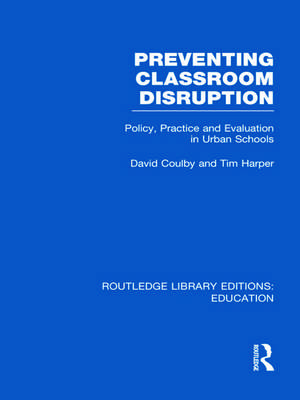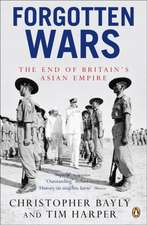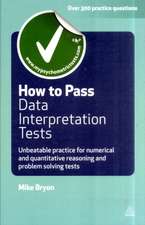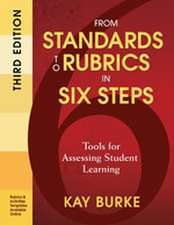Preventing Classroom Disruption (RLE Edu O): Policy, Practice and Evaluation in Urban Schools: Routledge Library Editions: Education
Autor David Coulby, Tim Harperen Limba Engleză Hardback – 8 dec 2011
This book advocates the latter philosophy and examines the best ways of coping with the problem. These concern both teacher skills and school organisational flexibility. In addition, the authors propose the provision of a support team whereby local authorities can help schools, teachers and children with problems of disruption without setting up ‘sin-bins’. Change is thus shown to be possible at three levels – teachers, headteachers and local authorities. Detailed illustrative case material is presented throughout the book.
Din seria Routledge Library Editions: Education
-
 Preț: 379.49 lei
Preț: 379.49 lei -
 Preț: 400.94 lei
Preț: 400.94 lei -
 Preț: 377.16 lei
Preț: 377.16 lei -
 Preț: 379.32 lei
Preț: 379.32 lei -
 Preț: 401.34 lei
Preț: 401.34 lei - 8%
 Preț: 382.25 lei
Preț: 382.25 lei - 18%
 Preț: 1332.87 lei
Preț: 1332.87 lei - 34%
 Preț: 819.90 lei
Preț: 819.90 lei - 27%
 Preț: 247.40 lei
Preț: 247.40 lei - 36%
 Preț: 819.90 lei
Preț: 819.90 lei - 36%
 Preț: 819.90 lei
Preț: 819.90 lei - 36%
 Preț: 991.00 lei
Preț: 991.00 lei - 36%
 Preț: 822.76 lei
Preț: 822.76 lei - 36%
 Preț: 821.53 lei
Preț: 821.53 lei - 29%
 Preț: 259.98 lei
Preț: 259.98 lei - 34%
 Preț: 764.20 lei
Preț: 764.20 lei - 36%
 Preț: 819.90 lei
Preț: 819.90 lei - 36%
 Preț: 761.85 lei
Preț: 761.85 lei - 36%
 Preț: 986.91 lei
Preț: 986.91 lei - 55%
 Preț: 541.50 lei
Preț: 541.50 lei - 36%
 Preț: 762.01 lei
Preț: 762.01 lei - 27%
 Preț: 261.37 lei
Preț: 261.37 lei - 36%
 Preț: 764.20 lei
Preț: 764.20 lei - 36%
 Preț: 762.97 lei
Preț: 762.97 lei - 36%
 Preț: 819.90 lei
Preț: 819.90 lei - 36%
 Preț: 986.91 lei
Preț: 986.91 lei - 36%
 Preț: 821.53 lei
Preț: 821.53 lei - 36%
 Preț: 819.90 lei
Preț: 819.90 lei - 36%
 Preț: 819.90 lei
Preț: 819.90 lei - 36%
 Preț: 821.13 lei
Preț: 821.13 lei - 38%
 Preț: 2100.27 lei
Preț: 2100.27 lei - 36%
 Preț: 819.90 lei
Preț: 819.90 lei - 36%
 Preț: 819.90 lei
Preț: 819.90 lei - 36%
 Preț: 764.20 lei
Preț: 764.20 lei - 36%
 Preț: 819.90 lei
Preț: 819.90 lei - 36%
 Preț: 986.91 lei
Preț: 986.91 lei - 36%
 Preț: 764.20 lei
Preț: 764.20 lei - 36%
 Preț: 819.90 lei
Preț: 819.90 lei - 36%
 Preț: 4048.76 lei
Preț: 4048.76 lei - 36%
 Preț: 736.38 lei
Preț: 736.38 lei - 36%
 Preț: 819.90 lei
Preț: 819.90 lei - 36%
 Preț: 821.53 lei
Preț: 821.53 lei - 36%
 Preț: 819.90 lei
Preț: 819.90 lei - 36%
 Preț: 819.90 lei
Preț: 819.90 lei - 36%
 Preț: 819.90 lei
Preț: 819.90 lei - 36%
 Preț: 819.90 lei
Preț: 819.90 lei - 36%
 Preț: 819.90 lei
Preț: 819.90 lei
Preț: 819.90 lei
Preț vechi: 1281.78 lei
-36% Nou
Puncte Express: 1230
Preț estimativ în valută:
156.91€ • 170.38$ • 131.80£
156.91€ • 170.38$ • 131.80£
Carte tipărită la comandă
Livrare economică 22 aprilie-06 mai
Preluare comenzi: 021 569.72.76
Specificații
ISBN-13: 9780415682626
ISBN-10: 0415682622
Pagini: 204
Dimensiuni: 156 x 234 mm
Greutate: 0.45 kg
Ediția:1
Editura: Taylor & Francis
Colecția Routledge
Seria Routledge Library Editions: Education
Locul publicării:Oxford, United Kingdom
ISBN-10: 0415682622
Pagini: 204
Dimensiuni: 156 x 234 mm
Greutate: 0.45 kg
Ediția:1
Editura: Taylor & Francis
Colecția Routledge
Seria Routledge Library Editions: Education
Locul publicării:Oxford, United Kingdom
Public țintă
General, Postgraduate, Professional, and UndergraduateCuprins
Preface. Introduction. 1 The Concept of Classroom Disruption. 2 A Model of Work of a School Support Team. 3 Evaluation of the Work of the Support Unit: Methods, Outcomes and Processes 4 Classroom Practice 5 School Organisation 6 The Role and Function of Support Services in a Local Education Authority 7 The Challenge of Disruptive Behaviour. References. Appendix. Index.
Descriere
There has always been considerable debate about the best solutions to deal with disruptive behaviour in schools. On the one hand is the strategy of segregating disruptive pupils while on the other is a commitment to keeping such pupils in the ordinary school.
This book advocates the latter philosophy and examines the best ways of coping with the problem. These concern both teacher skills and school organisational flexibility. In addition, the authors propose the provision of a support team whereby local authorities can help schools, teachers and children with problems of disruption without setting up ‘sin-bins’. Change is thus shown to be possible at three levels – teachers, headteachers and local authorities. Detailed illustrative case material is presented throughout the book.
This book advocates the latter philosophy and examines the best ways of coping with the problem. These concern both teacher skills and school organisational flexibility. In addition, the authors propose the provision of a support team whereby local authorities can help schools, teachers and children with problems of disruption without setting up ‘sin-bins’. Change is thus shown to be possible at three levels – teachers, headteachers and local authorities. Detailed illustrative case material is presented throughout the book.









